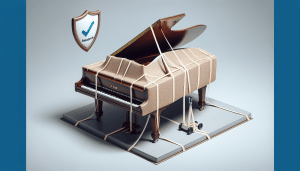Your piano is not just a musical instrument; it’s a work of art and craftsmanship that deserves the utmost care and attention, especially when it comes to storage. Proper climate control and humidity management are essential factors in maintaining the health and longevity of your piano. At Midvale Piano Movers, we understand the significance of creating an ideal storage environment for your cherished instrument. In this article, we’ll explore the importance of climate control and humidity for piano storage and provide essential guidance on preserving your piano’s condition.
Contents
The Impact of Climate on Pianos
Pianos are delicate instruments that are highly sensitive to changes in temperature and humidity. Here’s how climate can affect your piano:
1. Temperature Fluctuations
Extreme temperature fluctuations can lead to expansion and contraction of the piano’s wooden components. This can result in structural issues and affect tuning stability.
2. Humidity Levels
Inconsistent humidity levels can cause the soundboard, strings, and other wooden parts to swell or shrink. This can lead to changes in tone quality, pitch, and even structural damage.
3. Moisture and Dryness
Excess moisture can lead to mold growth, corrosion of metal parts, and damage to the wood finish. Conversely, excessive dryness can cause wood to crack, keys to stick, and tuning instability.
The Importance of Climate-Controlled Storage
Climate-controlled storage provides a stable and controlled environment for your piano. Here’s why it’s essential:
1. Temperature Regulation
Climate-controlled storage facilities maintain a consistent temperature range, protecting your piano from extreme heat or cold.
2. Humidity Management
These facilities also monitor and regulate humidity levels. Maintaining an optimal humidity range (around 40-45%) helps prevent damage to the wood and metal components.
3. Protection from Extremes
Climate control protects your piano from the harmful effects of extreme weather conditions, such as high humidity in summer and dryness in winter.
Tips for Proper Piano Storage
Whether you’re storing your piano for a short period or an extended duration, here are some essential tips for proper piano storage:
1. Choose a Climate-Controlled Space
Opt for a storage location with climate control capabilities to ensure a stable environment for your piano.
2. Elevate the Piano
Place the piano on a piano skid or board to elevate it off the ground. This prevents contact with moisture and offers better protection.
3. Cover the Piano
Use a piano cover or cloth to protect the instrument from dust and debris. Ensure that the cover allows for proper ventilation.
4. Regular Maintenance
Even in storage, your piano may require occasional tuning and maintenance. Consult a professional tuner or technician for periodic check-ups.
5. Avoid Direct Sunlight
Keep your piano away from direct sunlight, as prolonged exposure can cause finish fading and damage.
Conclusion
Proper climate control and humidity management are essential for preserving your piano’s condition during storage. Investing in climate-controlled storage facilities and following the tips mentioned above will help ensure that your cherished instrument remains in optimal playing condition for years to come.
If you have any questions or require assistance with piano storage or transportation, please contact us at 801-396-7323 or visit our website. At Midvale Piano Movers, we’re dedicated to providing the best solutions for the care and maintenance of your piano.




